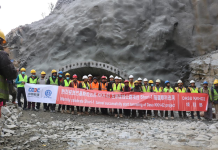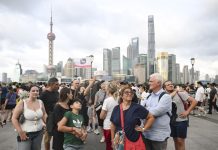Hong Kong: It was a cold, rainy morning on Feb 20 when Chiu Wai-a 23-year-old engineer-arrived at the construction site of an isolation facility at Penny’s Bay in Hong Kong.
Chiu’s first vision of the site was woodland and shipping containers doubling as offices.
The young engineer had received a phone call 10 hours earlier asking him to join the construction project.
He and his colleagues at China State Construction International Holdings had been assigned the task of building 6,500 isolation units on the site within five months to help the city in its fight against its worst wave of COVID-19 cases.
Since late February, daily infections in Hong Kong have skyrocketed, reaching a high of nearly 77,000 on March 3.
To provide more quarantine units for patients, the Chinese mainland stepped in to help Hong Kong build nine isolation facilities, including expansion work of facilities at Penny’s Bay.
Chiu was mainly responsible for monitoring the work and reporting on its progress to his company. Every day he has to walk 20 minutes to the pier to receive and check the quality of 100 reinforced steel bars used in the construction work.
He also sends up a drone three times a day to look at how the facility is developing and has the task of checking the isolation units’ equipment for treating COVID-19 patients.
When the project started, it had been raining continuously, turning the site into a giant quagmire.
Walking on the site wasn’t easy as Chiu said, his shoes would often get stuck in the mud, with construction work almost impossible. Water leaked from the office ceiling and workers used buckets to catch the drops.
Chiu works from 8 am to 9 pm every day and is unable to take a day off. Given the tight work schedule, his company gives on-site workers five meals a day and Chiu eats at his desk or in an open area at the site.
Since accepting the assignment, Chiu has been provided accommodation at a nearby hotel by his company and has only gone home once.
Apart from his busy work schedule, Chiu is taking construction-related postgraduate courses at the Hong Kong University of Science and Technology. After finishing work each day, he spends his free time attending lectures and doing assignments.
Chiu’s family was initially against him working on the Penny’s Bay project for fear he would get infected.
Many COVID-19 patients have been admitted to units completed under the first four construction phases of the quarantine facility, which is adjacent to Chiu’s construction site.
But after his mother saw videos of elderly people being treated in the corridors and on the balconies of Hong Kong hospitals due to the severe shortage of wards, she changed her mind.
“This job is meaningful as it can help more patients get admitted to isolation facilities. You’re serving the community,” she said.
Fortunately for Chiu, he hasn’t been infected, but many of his colleagues caught the virus in early March.
Chiu carried their workload along with another colleague.
He said he and his colleagues want to do their best to complete the project.
Chiu’s mother also contracted the virus. To avoid interrupting his work, he didn’t go home to take care of her and could only express his concern for her well-being via video calls.
He said he felt quite guilty, but his mother encouraged him to continue working and not worry too much about her.
Chiu’s co-workers see him as an amiable and reliable colleague. According to a technician who works with him in the same office, Chiu always gives quick and accurate answers about the project’s progress, even when the young engineer is off duty.
Besides the Penny’s Bay project, Chiu has also participated in the construction of the Hong Kong Palace Museum and joined a six-month exchange program at Tsinghua University.
Chiu believes the unprecedented public health crisis has further deepened the close bonds between Hong Kong and the mainland.
He hopes to use his experience to bring young people on both sides even closer in the future. -The Daily Mail-China Daily News Exchange Item





